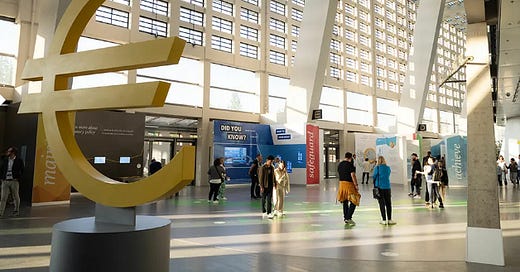ECB Cuts Rates Amid Trump Tariffs, Eurozone Growth Concerns
Concerns about global political instability have influenced the ECB's decision-making
The European Central Bank (ECB) lowered its benchmark deposit rate by 25 basis points on Thursday, marking the seventh cut since June 2024.
The decision was based on “the dynamics of underlying inflation and the strength of monetary policy transmission,” the ECB said. Most measures suggest that inflation will settle at around 2% of the ECB medium-term target on a sustained basis, the central bank said.
The ECB began cutting rates in June 2024, following a decline in inflation to 2.6% after peaking at 10.6% in October 2022. The bloc's central bank felt it needed to ease monetary policy to support the economy, as high interest rates had dampened investment and consumer spending.

ECB interest rates on the deposit facility, the main refinancing operations, and the marginal lending facility will be decreased to 2.25%, 2.40%, and 2.65%, respectively, the central bank said today.
ECB Moves to Project Eurozone From Global Uncertainty
European Union (EU) monetary officials have sought to protect the eurozone from the impact of weaker global trade, market volatility, and the uncertainty surrounding US trade policy under President Donald Trump.
S&P Global lowered its 2025 global GDP growth projections on Wednesday to 2.2% from 2.5% amid the Trump administration’s tariff war.
“The euro area economy has been building up some resilience against global shocks,” the ECB said. “But the outlook for growth has deteriorated owing to rising trade tensions. Increased uncertainty is likely to reduce confidence among households and firms.”

Concerns about global political instability have influenced the ECB's decision-making.
“Geopolitical tensions, such as Russia’s unjustified war against Ukraine and the tragic conflict in the Middle East, also remain a major source of uncertainty,” Christine Lagarde, ECB governor, said today. “At the same time, an increase in defence and infrastructure spending would add to growth.”
EU leaders have allocated €800 billion to defense investments as they grapple with a shift in the global order under the Trump Administration. Brussels has expressed alarm at Washington’s push for a peace deal between Russia and Ukraine without EU involvement.
Trump’s Tariffs Disrupt Europe’s GDP Outlook
Trump’s tariff war has curbed optimism about the eurozone’s economic outlook. US tariffs had included a 20% blanket levy on EU goods and active tariffs on European autos, steel, and aluminum.
The Trump administration then paused the tariffs for 90 days to allow for negotiations with the EU. Brussels has also put its retaliatory tariffs on hold to facilitate dialogue.
“The never-ending back-and-forth have brought back growth concerns for the eurozone,” ING Think said on Thursday. This has offset “previous optimism stemming from the German fiscal policy U-turn, at least in the near term,” it said.
Lagarde said last week that the bank “is always ready to use the instruments that it has available,” hinting at a continued dovish stance.
BCA Research Points to Upside After Trump’s Tariffs
Investment firm BCA Research, in a report titled “Trump the Unifier,” pointed to an upside to Trump’s trade policies. Chief Strategist Mathieu Savary noted that “ironically, Trump is doing more to advance European unity than anyone since Schumann, Monnet, and Adenauer.”
BCA forecasted a mild eurozone recession by mid-2025, but one softened by coordinated fiscal support and monetary easing. Importantly, Savary argued that US protectionism could catalyze overdue structural reforms.
This would push Europe closer to completing its single market and launching new trade ties outside the US. The World Economic Forum (WEF) also highlighted the EU's ability to absorb shocks, thanks to its robust trade bureaucracy.
“The EU’s setup makes it uniquely well-positioned to manage a tariff war,” Andrew Caruana Galizia, WEF’s Head of Europe and Eurasia, said on April 11. “It has an extremely competent trade bureaucracy with the power to negotiate on behalf of the entire bloc, and it can take far-reaching countermeasures without unanimity among its 27 member states.”
Europe Faces Steep Challenges With Trump’s Tariffs
Still, challenges persist. The prospect of US tariffs on critical EU sectors, such as pharmaceuticals and semiconductors, could deepen economic contraction if implemented. European GDP grew just 0.1% in Q4 2024.
Business investment and consumer sentiment remain subdued, while capital expenditure is declining. In response, German economic sentiment plummeted on Tuesday to multi-year lows on Trump’s “Liberation Day” speech.
ING Think forecasted that the German economy will stagnate in this year's second and third quarters, resulting in 0.5% GDP annual growth. It warned that economic forecasts are “highly uncertain” given that the trade situation “may swiftly change again.”
Following Germany, the economic sentiment in the eurozone region also plummeted, according to the ZEW, a German non-profit organization.
Euro Strengthens, Energy Prices Ease With Trump Tariffs
Trump’s tariffs have helped slow inflation in Europe, according to ING Think.
“The strengthening of the euro and the drop in energy prices have added to the disinflationary impact that the current trade tensions will have on the eurozone,” it said.
Bond markets remain resilient, with German bunds seen as a haven. Despite short-term equity volatility, BCA expects European assets to outperform their US counterparts as reforms take hold.
The German equity benchmark, the DAX, is up around 5.85% year-to-date, while its US counterpart, the S&P 500, is down around 10%.
Germany’s fiscal overhaul and growing trade partnerships with countries like India and Canada hint at a stronger post-crisis Europe.
A fresh start with China also seems on the cards. Xi Jinping said that China and the EU should “jointly resist unilateral bullying.” XI commented while hosting Spanish Prime Minister Pedro Sánchez last week in Beijing.
“Tactically, a move towards more bilateral co-operation between these two economic heavyweights expands their potential leverage in any talks with the US as well,” François Chimits, an economist at the Mercator Institute for China Studies, said.





